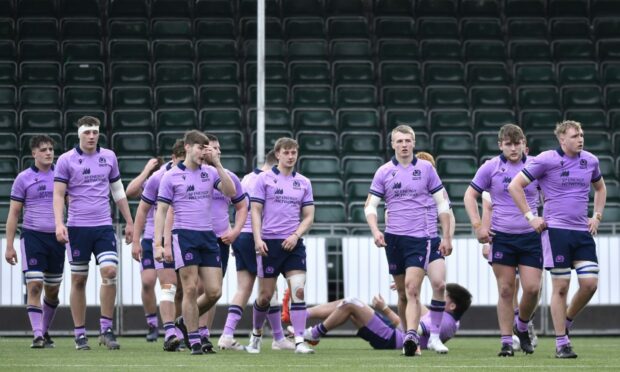There’s a serious crisis in Scottish rugby. Right now.
Yes, the Guinness Six Nations that ended at the weekend was, within reasonable argument, the best Scotland have performed since the championship enlarged in 2000.
The progress isn’t quick enough for some. But progress is being made. Scotland are no-one’s pushovers.
The two huge matches at this autumn’s World Cup in France against South Africa and then Ireland are still formidable challenges. But you feel Scotland have a basic team and a strategy that at least makes them competitive.
So, a crisis? When the national team, the cynosure of our sport, is maybe the best it’s been for more than 20 years?
Scratch the surface, however, and you can clearly see it. And it may be above the surface quicker than we expect.
Under-20s remain at a low ebb
A record-breaking W for our Ireland U20s in Glasgow! 💪#FutureIsGreen | @PwCIreland pic.twitter.com/aMIGN0Jw8A
— Irish Rugby (@IrishRugby) March 10, 2023
The Scotland Under-20s team snapped a 15-game losing streak in the Junior Six Nations this year, beating Wales. They had previously lost a thriller against England in their opening game.
In the final three games against France, Ireland and Italy, however, they were outscored a whopping 176 to 36. The 82-7 rout at home to the Irish – who eventually won a second successive J6N Grand Slam – was a new low.
Scotland won’t even play in the top flight of the World Under-20 Championship when it’s relaunched in South Africa this summer after two years of Covid abeyance.
Not among the top 12 teams, they’ll instead attempt promotion in the Junior World Trophy in Kenya, against the likes of Portugal and Uruguay,
Head coach Gregor Townsend does not have responsibility for development, although he’s acutely aware of the situation.
“We have to be better at getting players in Scotland through, 100 per cent,” he said last week. “There are lessons all around, from Ireland in particular, from Italy in the last few years.
“If you can get your own players through quicker then that’s going to help you long term.
“We’ve got to give players opportunities to play at a higher level and there’s a lot of things that go into that. We’ve got to back them earlier because often, these players that do get these opportunities, they grab them.”
‘We all know what evidence is there’
🤌 Perfectly weighted kick from Garbisi.#GuinnessSixNations #SCOvITA pic.twitter.com/LvZH8OQn7z
— Planet Rugby (@PlanetRugby) March 18, 2023
That being said, observed Townsend, for whatever reason, this is simply not happening. And it’s clearly reflected in the results of the Under-20s.
“We all know what evidence is there,” continued Townsend. “No under-20s players from the past two or three years are playing at pro level or are in (Glasgow and Edinburgh) pro squads.
“Now whether that’s because our squad sizes are the right number for them or (if) are we doing enough at the 15 to 18 age to help them to come through, it’s the reality.
“Look at the Garbisi brothers at Italy – one is starting at stand-off and one is on the bench. The younger brother (Allesandro) is a scrum-half who played for their U20s last year.
“The two Wales centres (against England) played U20s against Scotland in the summer last year.
“That’s what we have get better at, getting our players up to that level where they can step up to pro level and international level, but also giving them the opportunities and the windows for that to happen.”
Townsend can see it up close – his sons Christian and Luke have both played for the Under-20s in the last two seasons.
Many of the current team came through the Under-20s together. Jamie Ritchie, Scott Cummings, the Fagerson brothers, George Horne, Darcy Graham and Blair Kinghorn were in the same groups through age-grade.
Rory Darge and Ollie Smith, along with upcoming Edinburgh players Ben Muncaster and Connor Boyle, came through at the same time later.
SQ players will not suffice to keep Scotland competitive
Report from @geerob that Scotland have made an offer to Mosese Tuipulotu, the younger brother of Sione.
21-year-old Mosese is also a centre.https://t.co/KdLpVyYEcH
— Murray Kinsella (@Murray_Kinsella) March 16, 2023
Our small player base means Scotland will always have to plug gaps with Scottish Qualified (SQ) players developed elsewhere. But it also requires a steady stream of those developed locally.
Nigel Carolan, Glasgow’s Irish assistant coach, estimates that Scotland is a full decade behind Ireland in development.
And we don’t have their huge and thriving schools system which feeds into the province junior teams. That was well-established and entrenched even when I briefly lived in Ireland, about 40 years ago.
Italy’s probably a more attainable template. There, they focused on youth development at club level and are starting to reap the benefits now.
Scotland’s Super6 competition – being revamped as the Super Series – has not been fit for its primary purpose (at least we thought) of giving developmental players a step-up route into representative rugby. Not nearly enough of the Under-20s play regularly in the competition.
Yet we expect them to compete in the J6N against players hardened by far more robust systems, some of whom are regulars in fully professional rugby.
Take a look at the national team now, you wouldn’t see a problem. But in five years – maybe sooner – we could be looking at a real dearth of viable candidates in the pro teams.
They won’t be able to plug that through their network of finding SQ players elsewhere. Domestic player development needs to get centre stage in terms of resources and attention at Murrayfield before it’s too late.

Conversation